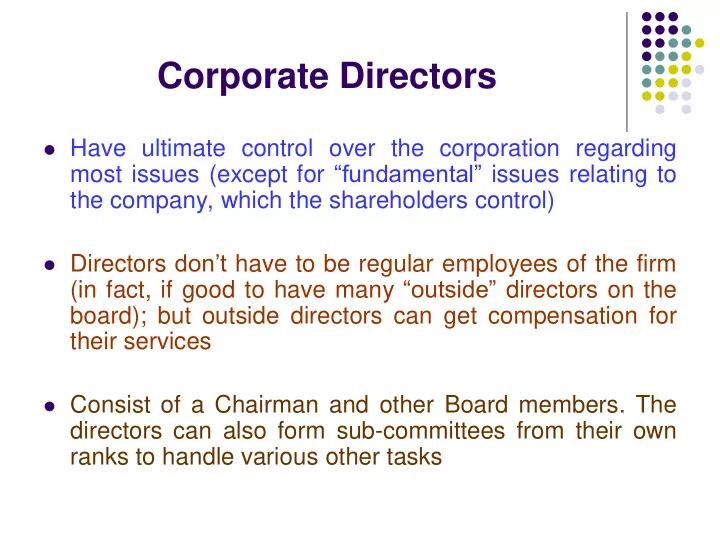

Corporate Directors Have ultimate control over the corporation regarding most issues (except for “fundamental” issues relating to the company, which the shareholders control) Directors don’t have to be regular employees of the firm (in fact, if good to have many “outside” directors on the board); but outside directors can get compensation for their services Consist of a Chairman and other Board members. The directors can also form sub-committees from their own ranks to handle various other tasks
Operation of the Board of Directors Tasks of the Board include: Holding annual meetings (required in many jurisdictions) Declaration of dividends Calling special meetings Creating board committee Hiring and firing executive officers Making recommendations to shareholders Board action is accomplished by majority vote; a subcommittee cannot act on behalf of the entire Board
Corporate Officers In charge of the day to day management of the corporation Examples of Officers: Chief Executive Officer (CEO) Chief Financial Officer (CFO) In house counsel President, Vice President etc.
Officers (cont.) Things that distinguish officers from other employees: Officers have contracting authority for the firm; which means the power to bind the corporation with deals or promises that the officer makes. Officers have “speaking” authority; their statements can be used by other parties as guarantees or policy statements of the firm. Officers have an “Obligations to Report” to the Board and/or shareholders as to the status of the firm; the nature of the reporting duty is often governed by the SEC Rules for bigger corporations
QUIZ TIME!
Fiduciary Duties: The Duty of Loyalty This duty requires that the officers and directors put the interest of the corporation over their own financial interests!
Examples of breach of the duty of loyalty Taking a corporate opportunity for oneself rather than offering it to the corporation. A corporate director who hears of an opportunity relating to the corporation’s business in his capacity as director must offer it to the corporation first, unless: The corporation has stated that it doesn’t want the opportunity; or The corporation absolutely cannot afford the opportunity Starting a “competing venture” – another company that competes with the corporation Engaging in an interested director transaction (a transaction with the corporation in which the director stands to benefit financially or otherwise) In the event of an interested (director or officer) transaction, a court will set aside the transaction unless the interested director or officer can show “entire fairness” in the transaction.
Remedies for Breach of the Duty of Loyalty Set aside the transaction Establish a “constructive trust” in which the profits from the transaction are held for the benefit of the corporation The director or officer can be liable in tort if the wrongful act hurt the corporation financially
Recommend
More recommend